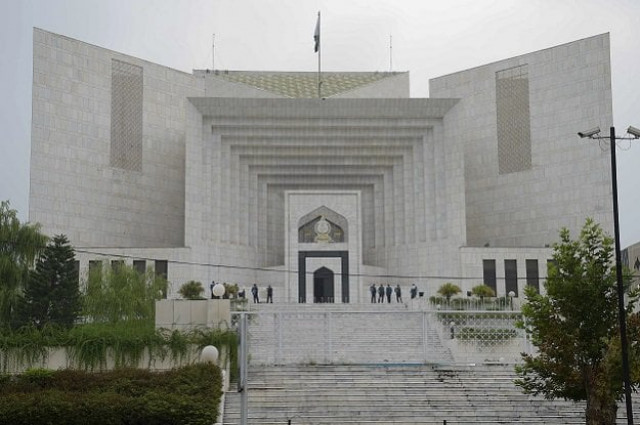SC rejects request to seek assistance from AGP on NSL matters
Resumes hearing of Hanif Abbasi’s plea for review of its judgment declaring Imran Khan honest

Supreme Court of Pakistan. PHOTO: AFP
A three-judge bench of the top court, headed by Chief Justice of Pakistan (CJP) Mian Saqib Nisar, resumed hearing of Abbasi’s petition seeking review of its December 15, 2017 judgment that had declared Khan, who is now the Prime Minister of Pakistan, honest and trustworthy.
Akram Sheikh, the counsel for Abbasi, contended that the court, in its verdict, overlooked the law while adjudicating the matter related to the NSL.
Sheikh also raised a question over the top court’s direction to the Election Commission of Pakistan (ECP) to limit the scrutiny of PTI’s foreign funding to last five years only.
Supreme Court declares PIA CEO appointment illegal
The counsel also called the ruling ‘inconsistent’, saying that it was in conflict with the Panamagate case judgment by a five-judge larger bench.
He also submitted that there were numerous non-declarations on the nomination papers and the annual statements of assets and accounts filed by the PTI chairman.
After giving his submissions, Sheikh requested the bench to issue a notice to the AGP for his reply on these points. However, after brief deliberations, members of the bench decided not to issue a notice to the AGP at this time.
The CJP said it is the duty of the court to remove any error in the judgment law. He also referred the judge pension case, wherein it had been held the apex court can revisit its judgments on the basis of error anytime.
The top judge also referred to a quote which says, “We are not final because we are infallible, but we are infallible only because we are final.”
After the break, Sheikh requested adjournment of the hearing as he had to fly for Lahore to attend his wife’s death anniversary. He requested the bench to give any other specific date for hearing.
Upon this, the CJP – in a lighter vein – said then the hearing will be scheduled after his retirement. Later, the bench adjourned the hearing for indefinite period.
CCI is subservient to parliament, says SC detailed verdict
It is also learnt that Abbasi’s wife had written to Sheikh to request the Supreme Court to postpone the hearing for 10 days for getting fresh instructions from her husband who is jailed for life in the ephedrine case.
The same bench had dismissed the petition seeking the PTI chief’s disqualification, observing that he had no legal obligation to disclose the NSL, his offshore company, as an asset in his income tax returns or his statement of assets and liabilities filed with the ECP along with his nomination papers or in his annual returns filed under Section 42A of the ROPA.
The top court had endorsed Khan’s stance that the Bani Gala property was owned by him after it was orally gifted to him by his ex-wife Jemima Khan vide gift mutation No.10696 dated 29.10.2005 after their divorce became effective in June 2004. Prior to that, the Bani Gala property had been purchased by the respondent as a family home for his wife and children for which the financial provision extended by his wife was more than what was reimbursed by the respondent on May 7, 2003.
The court had also noted that the petitioner failed to bring forth any concrete evidence to establish a different purpose for the NSL, and it had no hesitation in believing the respondent’s contention that the NSL was created solely to own and hold the London flat in order to avoid capital gains tax.



















COMMENTS
Comments are moderated and generally will be posted if they are on-topic and not abusive.
For more information, please see our Comments FAQ